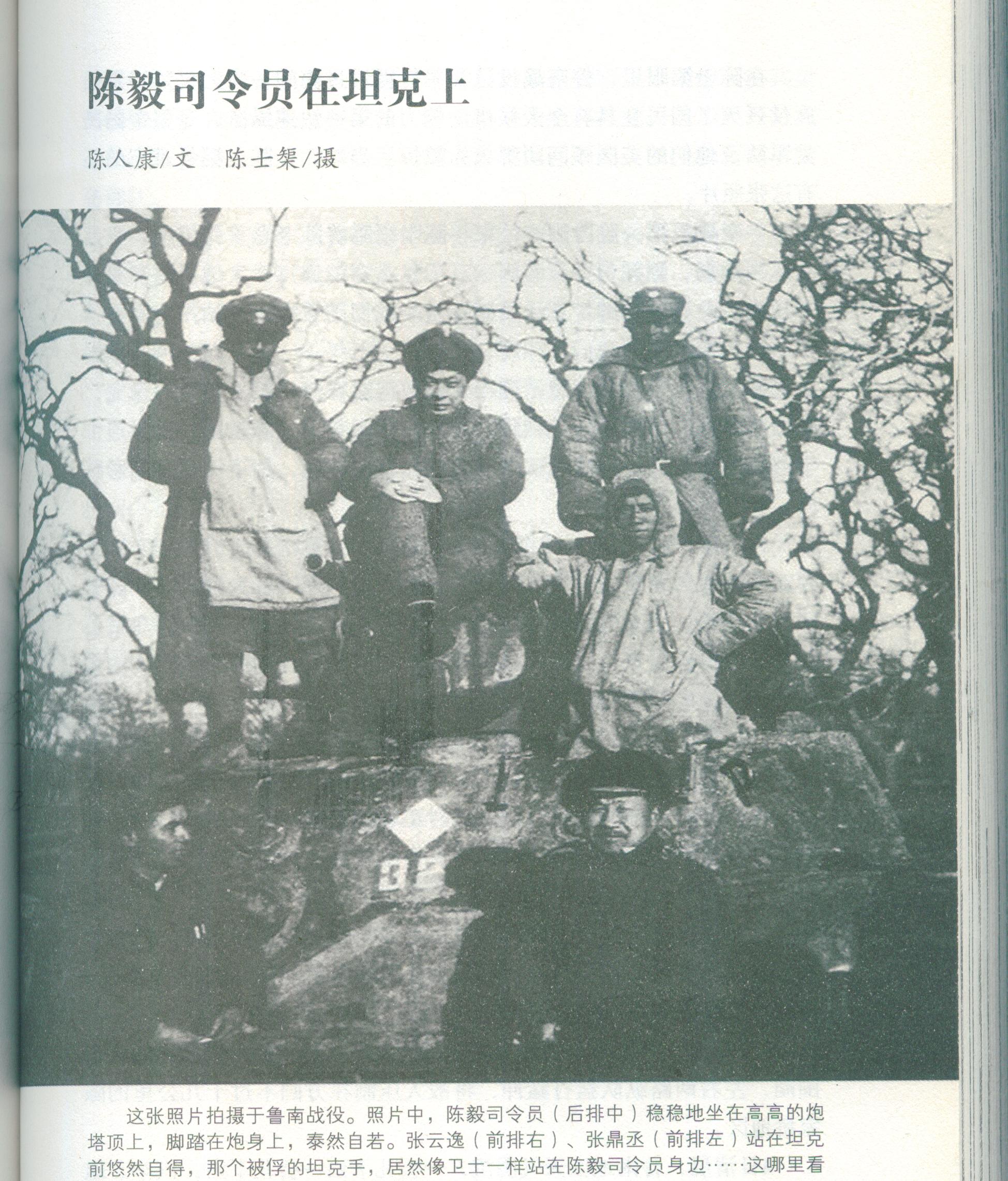In Chen Shiyu's eyes, the Battle of Lunan was the most enjoyable battle fought by our army, especially this battle annihilated the Kuomintang's first fast column with all-weather mobility capabilities, which greatly shocked the entire Kuomintang army and their American advisory group. Of course, what made Chen Shiyu most memorable was this photo.

The first phase of the Lunan Campaign had just ended, Chen Shiyu accompanied Chen Laozong, Zhang Yunyi, and Zhang Dingcheng to inspect the battlefield, and Commander Chen Yi was so happy to see that so many tanks and cannons had been captured. Some captured tank soldiers saw Chen Shiyu and they looked left and right around the tank, and said very unconvincingly: "We have been fighting in India and Burma for three years, and we have been rushing forward, and the Americans have also looked at us with astonishment, and we could not imagine that we would lose so badly today!" Unexpectedly, as soon as he finished speaking, Chen Yi laughed loudly, and then, he climbed onto the tank with great interest, and Chen Shiyu saw it and quickly held up the German Zeiss camera that had just been captured from Chiang Kai-shek's rapid column and captured this wonderful moment.
In January 1947, the Central Military Commission merged the Shandong Field Army and the Central China Field Army into the East China Field Army. Chen Yi is the commander and political commissar, Su Yu is the deputy commander, Tan Zhenlin is the deputy political commissar, Chen Shiyu is the chief of staff, and Tang Liang is the director of the political department. In order to fight the Lunan Campaign well, Commander Chen Yi asked Chief of Staff Chen Shiyu to formulate a battle plan. Chen Shiyu put forward a basic combat plan based on the situation of the enemy and us, and the plan was quickly adopted.
On January 2, 1947, when the enemy was still immersed in the new year's day celebration, our army suddenly launched an attack on the enemy. The enemy's Twenty-sixth Division was first divided and encircled by our army and cut off from the retreat route. Ma Liwu, the commander of the enemy's 26th Division, was attending the New Year's Day party at the local area at this time, and he never imagined that when he was enjoying the Beijing opera in the audience, his troops were already in a big disaster.
The commander of the First Rapid Column, Chiang Wei-kuo, was also enjoying new Year's Day in Xuzhou, and what surprised him was his Rapid Column, one of the main forces on which his father Chiang Kai-shek relied to launch the civil war, was under fire from our army.
On the night of the 3rd, our attacking troops narrowed the encirclement of the Nationalist 26th Division and the First Rapid Column, and the left and right columns slammed into each other, suppressing the enemy in the Chenjiaqiao area, which was no more than a dozen kilometers in circumference.
In the early morning of the 4th, the weather in the Lunan area was gloomy, it rained for a while and snowed for a while, and cars and tanks fell into the mud from time to time and could not move. The enemy's aircraft did not move due to weather reasons, and the mechanized equipment lost its proper role. Originally, our army could destroy them all with artillery fire, but in order to capture these equipment, Chen Shiyu ordered that the artillery should not be fired, that the infantry should kill and injure the enemy at close range, and that these American equipment should be preserved as completely as possible so that our army could equip the troops in the future.
The order played an important role, the soldiers no longer pursued the panicked enemy soldiers, and the equipment of the first rapid column was guarded as long as there was no threat to our army. In this way, not only many cars, artillery, and tanks were preserved intact, but a large number of prisoners also survived.
Later, Chen Shiyu was praised by Commander Chen Yi. Chen Yi said, "We can also engage in a rapid column this time!" After the Battle of Lunan, Hua Ye used the captured equipment to set up the first special forces column of our army, and Chen Ruiting, former chief of staff of the New Fourth Army, who was an artilleryman, became the commander of the special column.
The 18-day Battle of Lunan not only annihilated the enemy's Twenty-sixth Division, two integrated divisions of the Fifty-first Division, and a rapid column, but also annihilated the enemy 5. More than 30,000 people have set a new record for annihilating the enemy in the East China battlefield since the Liberation War, and have also captured 24 tanks, 104 howitzers, field artillery, and mountain guns, 474 cars, 113 light and heavy mortars, 1,025 light and heavy machine guns, and more than 7,000 long and short guns. At the same time, our central China and Shandong field armies have also accumulated experience in fighting against the enemy's mechanized units, and have provided initial material preparations for the subsequent formation of their own special forces columns.
Chen Shiyu (1909-1995), a native of Jingmen, Hubei Province. He joined the Communist Party of China in October 1927. He participated in one to five anti-"encirclement and suppression" campaigns in the Central Soviet Region and participated in the Long March. Former commander of the engineering corps of the Central Military Commission and commander and political commissar of the Special Engineering Command. He was awarded the rank of General in 1955.